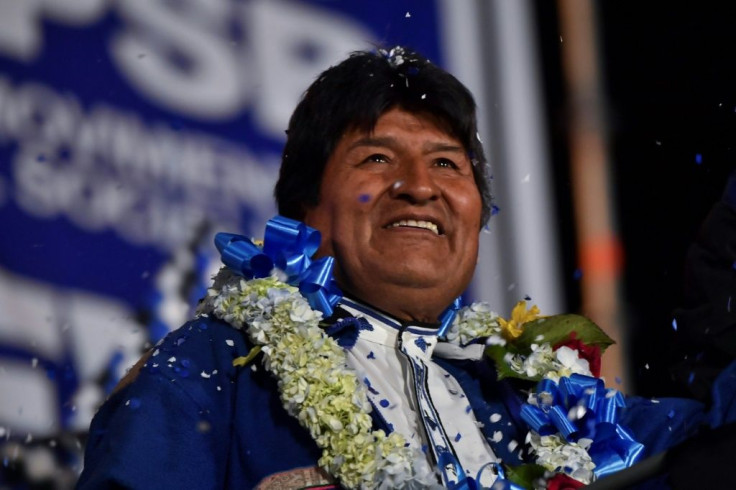Latin America's Longest-serving Leader Morales Claims Fourth Term

Evo Morales, Latin America's longest-serving president who Thursday claimed a fourth term as Bolivia's president, is the country's first indigenous head of state.
A member of the Aymara people, he grew up in poverty on Bolivia's high plains and was a llama herder, coca farmer and leftist union leader before rising to become president in January 2006.
His victory in Sunday's elections -- verified by the heavily-criticized Supreme Electoral Tribunal -- will extend his mandate until 2025 and give him 19 consecutive years in power.
At 59, he is now the longest-serving president in Latin America and one of the last of the wave of leftist leaders who swept to power in the region in the early 2000s.
Those leftist governments have since fallen away, torn down by a conservative backlash in Brazil, Argentina, Chile and Ecuador.
But "Bolivia is different, we're doing well," Morales insisted at a recent rally of his Movement for Socialism (MAS) party.
Landmark gains
More than 60 percent of Bolivia's 11.3 million people are from 36 indigenous groups, including Morales' Aymara people.
The president remains popular with Bolivians for landmark gains against hunger and poverty and for dragging his country into the 21st Century, building the world's highest cable car and launching the country's first satellite.
Sitting on the region's second-largest gas reserves, after Venezuela, and the world's largest reserves of lithium, Bolivia's economy has more than tripled in size during his 13 years in office.
However, opponents accuse him of tolerating corruption and investing in flashy infrastructure projects at the expense of health and education. A case in point is his decision last year to move the government headquarters into a luxurious skyscraper in La Paz.
While still among the poorest countries in Latin America, Bolivia's poverty rate has decreased from 45 percent of the population in 2010 to 35 percent in 2018, according to the World Bank.

Environmentalists blame him for raging wildfires that destroyed more than four million hectares (10 million acres) of forest and grassland, saying legislation enacted under Morales encouraged wholesale deforestation in order to expand agricultural production.
It's all a long way from his childhood herding llamas and helping his parents in the fields in a small, arid village in western Bolivia's Oruro department.
"Until I was 14, I had no idea there was such a thing as underwear. I slept in my clothes... (which) my mother only removed for two reasons: to look for lice or to patch an elbow or a knee," he wrote in a candid autobiography.
Four of his six brothers and sisters died of malnutrition and disease before the age of two.
Referendum defeat
Morales never went to college and has considerable difficulty reading speeches in public, preferring to improvise by repeating phrases about the economic strides made under his government.
Morales has been re-elected twice before with large majorities. His only defeat at the polls came in a 2016 referendum when he tried to amend Bolivia's constitution to run for a fourth time.
Refusing to accept defeat, he petitioned the country's highest court, which analysts say is packed with his allies and which backed his right to run again.
The move led to protests and allegations of corruption from the opposition, whose candidate, former president Carlos Mesa, provided Morales with his stiffest electoral test yet.
Morales has urged the electorate to give him "five more years to complete our great projects" and continue to expand one of Latin America's fastest growing economies.
Under Morales, Bolivia has increased foreign investment, particularly from China, to help it exploit its rich natural resources and is on track to become the world's fourth largest producer of lithium by 2021.
A fierce critic of the United States, Morales is a staunch ally of leftist governments in Cuba and Venezuela.
© Copyright AFP 2024. All rights reserved.





















